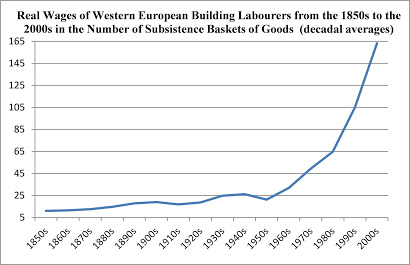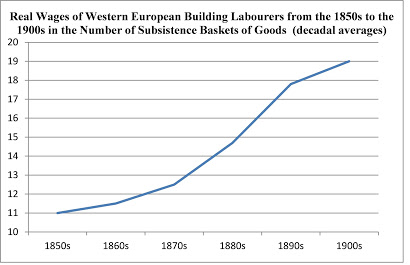To the Marxists everywhere, my simple challenge: Is your view that Marx’s theory of wage determination in volume 1 of Capital that real wages in capitalism can and will rise above the value of the maintenance and reproduction of labour, and in the long run will keep rising, vastly improving the living standards of workers? If you say “yes,” then my refutation here of Marx’s view of a rising rate of exploitation in capitalism (from increasing surplus value extracted from workers) is vindicated.If not, and you think that Marx’s view was that wages tend towards the value of the maintenance and reproduction of labour (and, yes, this was Marx’s view: see here and here), then you need to explain the data on the soaring real wage in capitalism over the past 160 years.The data in de Zwart et al. (2014) provide a useful summary of the long-run trend in modern capitalism, but for the real wages of building labourers from the 1820s to the 2000s. They provide decadal averages of the real wage of building labourers in Western Europe but expressed in the quantity of subsistence baskets of goods that the daily wage buys.The long-run trend can be seen in the graph below (with data from de Zwart et al. 2014: 80, Table 4.4). As we can see and beyond any doubt, real wages for building labourers have soared in the long run.
Topics:
Lord Keynes considers the following as important: 1850s-2000s, challenge, Marx, Marxists, Real Wages, theory of wage determination in volume 1 of Capital
This could be interesting, too:
Matias Vernengo writes Milei and real wages in Argentina
Matias Vernengo writes Inflation, real wages, and the election results
Michael Hudson writes Beyond Surface Economics: The Case for Structural Reform
Bill Haskell writes Der Gefesselte Marx
If you say “yes,” then my refutation here of Marx’s view of a rising rate of exploitation in capitalism (from increasing surplus value extracted from workers) is vindicated.Is your view that Marx’s theory of wage determination in volume 1 of Capital that real wages in capitalism can and will rise above the value of the maintenance and reproduction of labour, and in the long run will keep rising, vastly improving the living standards of workers?
If not, and you think that Marx’s view was that wages tend towards the value of the maintenance and reproduction of labour (and, yes, this was Marx’s view: see here and here), then you need to explain the data on the soaring real wage in capitalism over the past 160 years.
The data in de Zwart et al. (2014) provide a useful summary of the long-run trend in modern capitalism, but for the real wages of building labourers from the 1820s to the 2000s. They provide decadal averages of the real wage of building labourers in Western Europe but expressed in the quantity of subsistence baskets of goods that the daily wage buys.
The long-run trend can be seen in the graph below (with data from de Zwart et al. 2014: 80, Table 4.4).
As we can see and beyond any doubt, real wages for building labourers have soared in the long run. Similar trends are apparent for other skilled, semi-skilled and unskilled workers, and for the average real wage, despite short-term regressive periods such as the First World War, the Great Depression, the Second World War, and the stagnation to some extent in real wages in the neoliberal period.
Because we are dealing here with 160 years of data and the y axis has such a broad range, the graph above obscures the rising real wage in the 19th century.
We can see the 19th century trend in the graph below (with data again from de Zwart et al. 2014: 80, Table 4.4).
So even in the 19th century under gold standard capitalism the real wages of building labourers in Western Europe in terms of the number of subsistence baskets of goods was soaring.
Despite Marx’s theory, wages were not tending towards the value of the maintenance and reproduction of labour, which is clearly a type of subsistence wage.
As I argued here, under the logic of Marx’s own theory (if we accept for the sake of argument the concept of surplus labour value) but contrary to what Marx himself argued, capitalism actually has had a historical long-run tendency to reduce the rate of exploitation. One cheer for capitalism!
BIBLIOGRAPHY
de Zwart, Pim, van Leeuwen, Bas and Jieli van Leeuwen-Li. 2014. “Real Wages since 1820,” in Jan Luiten van Zanden, Joerg Baten, Marco Mira d’Ercole, Auke Rijpma, Conal Smith and Marcel Timmer (eds.), How was Life?: Global Well-Being since 1820. OECD Publishing, Paris. 73–86.


